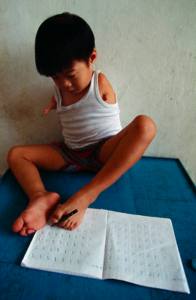

MedFriendly®


Abrachia
Abrachia is a condition present from birth in which the baby is born
without arms. However, the term can also be used to refer to being
without arms, beginning at any point in life, such as in adulthood
due to amputations after battlefield injuries (e.g., from explosions)
suffered during war. Abrachia is typically used to refer to people
born without both arms but is sometimes used to refer to someone
missing one arm (e.g., after a shark bite). The shoulder bones may
also be reduced in size in someone with abrachia. In children born
with the condition, abrachia was a known birth defect that could
occur after maternal use of thalidomide during gestation.
Thalidomide was a medicine used to treat morning sickness and to
improve sleep but it was only sold from 1957 to 1961, being
removed from the market for causing birth defects.
FEATURED BOOK: Encyclopedia of Genetic Disorders and Birth Defects
Abracia can be seen in the picture above. People with abrachia often leanr to write with
their toes as in the picture above. Abrachia is known to occur in humans and non-human
animals. The condition can be compensated for with prosthetic (manufactures) arms.
Some prosthetic arms are only used to improve appearance while others are functional.
Prosthetic arms are much less functional then prosthetic legs. Most can only move at the
wrist, elbow, and open and close. However, scientists are developing more functionally
advanced prosthetic arms. Abrachia comes from the Greek word "a" meaning "without,"
and the Greek word "brachion" meaning "arm." Put the words together and you have
"without arm(s)."
"Where Medical Information is Easy to Understand"™
















